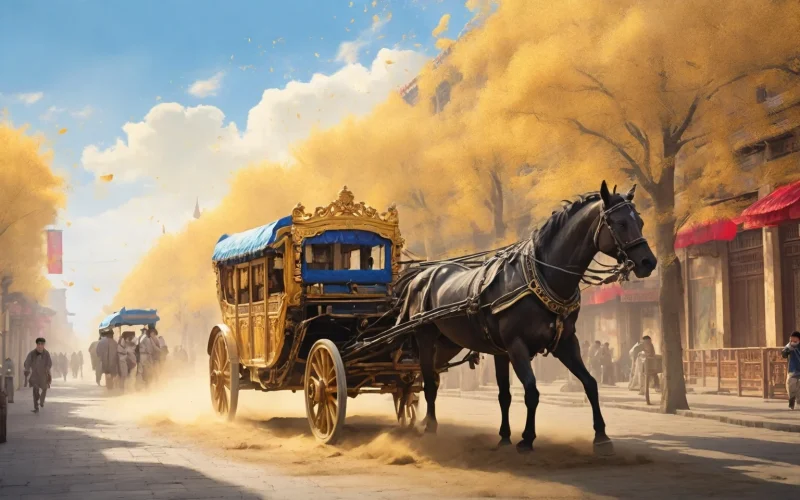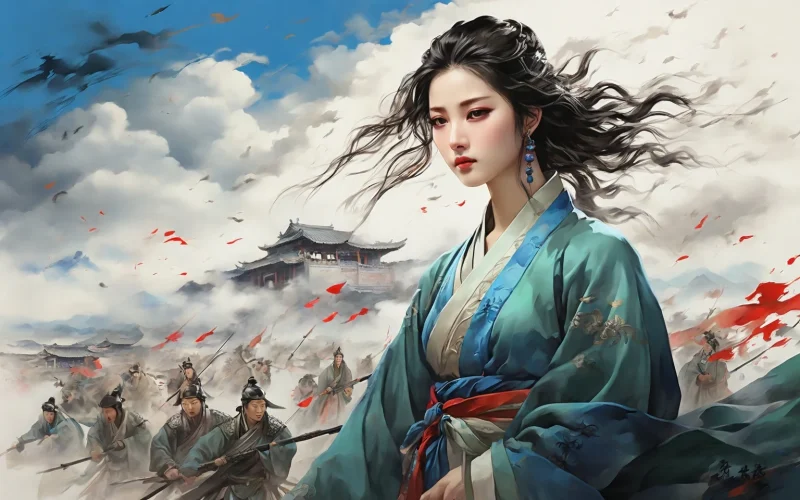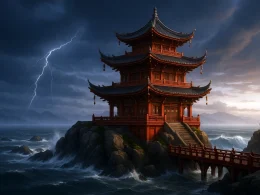Over Royal Terrace when crows flew back to their nest,
The king in Royal Palace feasted his mistress drunk.
The Southern maidens sang and danced without a rest
Till beak-like mountain peaks would peck the sun half sunk.
The golden clepsydra could not stop water's flow,
Over the waves the autumn moon was hanging low.
Would not the king enjoy his fill in Eastern glow?
Original Poem:
「乌栖曲」
李白
姑苏台上乌栖时,吴王宫里醉西施。
吴歌楚舞欢未毕,青山欲衔半边日。
银箭金壶漏水多,起看秋月坠江波。
东方渐高奈乐何!
Interpretation:
"Crows Flying Back to Their Nest" was written by Li Bai during his travels to the Wu and Yue regions in the 19th year of the Kaiyuan era (731). On the surface, the poem describes the luxurious lifestyle of King Fu Chai of Wu and his concubine Xishi, but in reality, it serves as a satire of Emperor Xuanzong of the Tang Dynasty, who was indulging in pleasures later in his reign. King Fu Chai had once built a palace for Xishi on the Su Tai, indulging in pleasure, and Li Bai uses the depiction of the debauchery in the Wu palace as an allegory for the political corruption in the Tang court. This poem not only reflects the degradation of society but also showcases Li Bai's deep reflection on the political and personal disappointments of the time.
First Couplet: “姑苏台上乌栖时,吴王宫里醉西施。”
(On the Su Tai, crows perch as the evening falls, and in the Wu King’s palace, Xishi sleeps drunkenly.)
This couplet intricately depicts the twilight atmosphere of the Wu palace. The "crows perched at dusk" carries metaphorical meaning, suggesting the decline and corruption of the palace. The image of "drunken Xishi" highlights King Fu Chai’s indulgence in pleasure and neglect of politics, also alluding to the passage of time and the emptiness of life. As a favored concubine, Xishi symbolizes desire and moral decay.
Second Couplet: “吴歌楚舞欢未毕,青山欲衔半边日。”
(The songs and dances of Wu continue joyously, while the green mountains begin to swallow half of the setting sun.)
This couplet depicts the lively festivities in the Wu palace, but the description of the "green mountains swallowing the setting sun" emphasizes the passage of time and the fleeting nature of joy. The transition from "unabated" to "about to" suggests King Fu Chai's ignorance of time's relentless progress and the transient nature of indulgence, implicitly revealing the philosophy of “too much joy leads to sorrow.”
Third Couplet: “银箭金壶漏水多,起看秋月坠江波。”
(In the palace, silver arrows rise as golden pots drip endlessly, and I rise to witness the autumn moon sinking into the river’s waves.)
Through the imagery of "silver arrows and golden pots," Li Bai captures the endless passage of time and the relentless flow of the night. The dripping pot symbolizes the passing of time, while the image of the "autumn moon falling into the river" conveys the loneliness and desolation of the night. This imagery reflects the debauched life in the Wu palace, using changes in nature to hint at its emptiness and melancholy.
Fourth Couplet: “东方渐高奈乐何!”
(The eastern sky brightens, what good is joy that cannot last?)
The poem ends with a rhetorical question that expresses regret about the fleeting nature of joy and indirectly critiques the lifestyle of the rulers. As dawn breaks, the night’s revelry comes to an end, and this final remark encapsulates the philosopher’s view: indulgence in pleasure inevitably leads to misfortune.
Writing Features:
- Symbolism of Time’s Passage: Through the depiction of the transition from day to night and seasonal changes, the poet links the passing of time with the moral decay of the palace, showing the desolation that follows after splendor fades.
- Use of Metaphor and Symbolism: The imagery of "crows at dusk," "green mountains swallowing half the sun," and "autumn moon falling into the river" not only sets the atmosphere but subtly reveals the social decay and the transience of history.
- Condensed and Profound Emotions: Li Bai does not directly attack the debauchery and corruption of the Wu palace but uses delicate descriptions of nature and the passage of time to express a subtle critique of rulers obsessed with indulgence.
Overall Appreciation:
This poem innovates in form, breaking from the traditional structure of yuefu ballads, and in content, it uses the depiction of the Wu palace's life to deeply criticize the political corruption of Emperor Xuanzong of the Tang Dynasty. Li Bai avoids direct criticism, instead using the passing of time and changes in nature to create a melancholic atmosphere, reflecting the relentless course of history and the fleeting nature of human desires. While the poem may seem nostalgic at first glance, it subtly criticizes the decadent lifestyle of the rulers. The final line, "The eastern sky brightens, what use is joy?" encapsulates the theme and reminds the reader that joy cannot last, and indulgence will inevitably lead to regret.
Insights:
The Crows Perch on the Su Tai reminds us that both individuals and nations, when consumed by pleasure and short-lived joy, will ultimately face decline. Li Bai, through delicate descriptions of nature and symbols of time’s passage, conveys a profound philosophy: no matter how enjoyable pleasure may seem, time will take it all away. The poem warns us against overindulgence in transient pleasures while neglecting long-term values and responsibilities. Additionally, through his subtle critique, Li Bai invites deep reflection on power corruption and the broader social issues of his time.
Poem translator:
Xu Yuan-chong(许渊冲)
About the poet

Li Bai (李白), 701 - 762 A.D., whose ancestral home was in Gansu, was preceded by Li Guang, a general of the Han Dynasty. Tang poetry is one of the brightest constellations in the history of Chinese literature, and one of the brightest stars is Li Bai.












